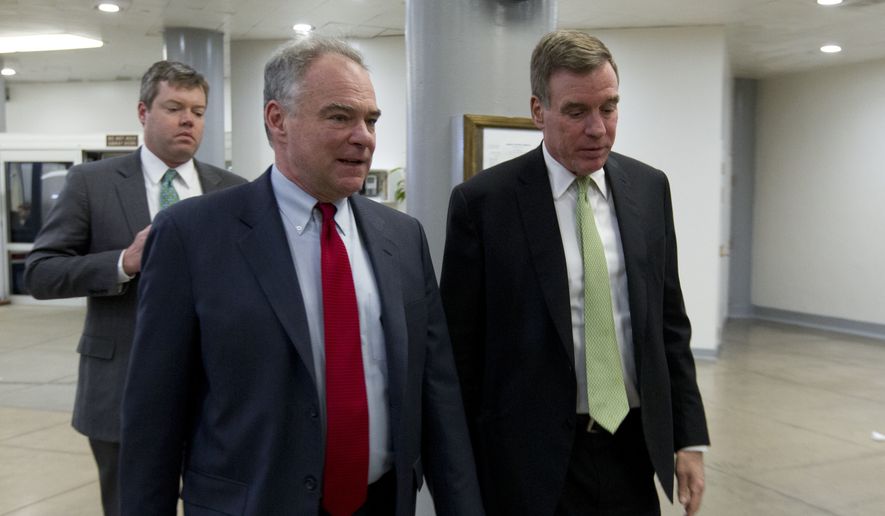The Senate passed legislation Thursday authorizing the Federal Aviation Administration for the next five years over the objections of Virginia and Maryland Democrats who sought to block a provision adding ten additional flights into or out of Ronald Reagan Washington National Airport.
The legislation authorizes more than $105 billion over five years for the nation’s aviation programs, much of it aimed at improving safety in the wake of close calls on airport runways and a string of airplane manufacturing and repair lapses.
Senate lawmakers passed the measure ahead of a midnight Friday deadline, when current authorization expires, and are expected to approve a week-long extension of current law to give the House time to pass the Senate bill next week.
The legislation passed over the objection of the four Democrats representing Maryland and Virginia who fought for an amendment to block the provision adding five round-trip flights in and out of Reagan, which is located in Arlington, Virginia, and serves the Washington metropolitan area.
The new flights could threaten safety at the nearly maxed-out airport, Sens. Tim Kaine and Mark Warner, Virginia Democrats, warned Thursday.
In a statement following the passage of the legislation, Mr. Kaine called additional flights “dangerous,” and said they would be “crammed onto one of the busiest airports in America.”
Mr. Warner and Mr. Kaine cited a near-miss last month on the runway at Reagan on April 18, when an air traffic controller directed a Southwest flight to cross a runway where a JetBlue flight was rolling for takeoff.
“Last month’s near miss at DCA is a flashing red warning light that this airport is overburdened and that cramming more flights onto the busiest runway in America is a terrible idea,” Mr. Warner and Mr. Kaine said Thursday.
The four senators said adding the flights would also increase delays at the heavily trafficked airport that already, according to the FAA, Reagan ranks 10th among U.S. airports for most flight delays.
The ten flights were a compromise number negotiated in the final bill. Other Senators had sought to add a higher number.
Because of its proximity to the District proper compared to Dulles and BWI airports, Reagan serves as the main airport for lawmakers in Congress to get to and from their states and districts.
Sens. Ben Cardin and Chris Van Hollen of Maryland also opposed adding new flights.
But opening up the legislation to a Democratic-authored amendment would likely have required cutting a deal with Republicans on their amendments.
Senate Majority Leader Chuck Schumer, New York Democrat, asked all senators to consent to holding a vote on Mr. Kaine’s amendment to strike the new flights from the bill but Sen. Ted Cruz, Texas Republican and co-author of the FAA reauthorization, objected.
Mr. Cruz, who is up for re-election in November, secured a new direct flight from San Antonio to Reagan. He said the new flights would benefit the public and that opening up the bill to one amendment could lead to the unraveling of the legislation.
He said Reagan has been expanded over the years to increase its capacity and that the near-miss in January had nothing to do with heavy traffic at the airport.
Mr. Cruz blamed “the more voracious opposition” to the new flights on “lobbying on behalf of United Airlines,” which opposes the new slots going to rival airline Delta.
“Five new flights into and out of Reagan would provide additional competition that would lower the price of tickets,” Mr. Cruz said.
Mr. Schumer called the vote for final passage of the bill over the objections of the four Democrats after warning lawmakers not to delay the bill over amendments.
“Absolutely nobody should want us to slip past the deadline,” Mr. Schumer said. “That would needlessly increase risks for so many travelers and so many federal workers.”
If the Senate had failed to pass the bill by Friday midnight the FAA would continue safety-related functions, such as air traffic control. But other programs could have been disrupted, including training and hiring, and technology upgrades.
The bill includes new spending and policies directed at rising safety threats.
Following an FAA report of 19 “serious” near-collisions on runways in 2023, the measure requires the administration to deploy new technology to track runway aircraft and vehicle movements.
The legislation also adds transparency, accountability and oversight provisions to FAA safety standards for designing and building aircraft.
The oversight provision was included in the bill following a string of safety incidents involving aircraft. Whistleblowers have complained that Boeing has lowered safety standards on manufacturing and maintaining planes.
In January, an emergency door plug blew off the side of a Boeing 737 Max 9 after takeoff due to missing door bolts. Inspections that followed found other Boeing aircraft with improperly installed doors.
The bill includes consumer-friendly provisions, such as one that will prohibit airlines from charging families extra to sit together.
• Susan Ferrechio can be reached at sferrechio@washingtontimes.com.




Please read our comment policy before commenting.